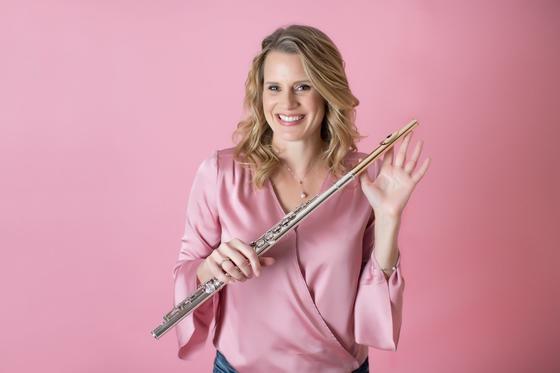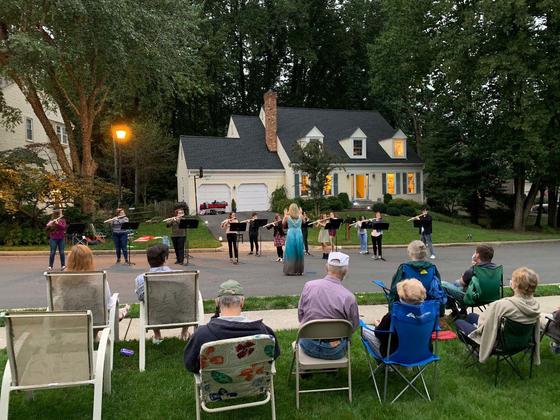In This Story
Imagine picking up your instrument to play when suddenly the last two fingers on your left hand become immobile. The flute, which you’ve been playing for 20 years, is now unable to comply to its full potential. Your fingers seem to work fine otherwise but turn motionless only when positioned on the flute. Confusing, isn’t it?
That’s exactly what happened to Julianna Nickel, an adjunct professor of flute and two-time recipient of Mason’s distinguished teacher of the year (2017 and 2019), at the peak of her career.

"I went from playing the flute to getting ready for a major symphony orchestra audition to not being able to play Mary Had a Little Lamb,” she said. “My condition was bad; it altered my career. I wanted to be an orchestral musician but you can’t get on a stage for an audition for an orchestra if you can’t be really close to perfect.”
Nearing the two-year mark of conducting research, seeing seven neurologists to get a diagnosis, and reaching out to people with similar challenges, she walked out with the same silence that resonated off of her flute. Determined to finding a cause, Nickel—with her infant daughter crawling at home—took a flight from Dallas to Houston to see her final doctor. The result was in: at only 31 years of age, Nickel was diagnosed with a rare neurological condition known as focal dystonia, which has no known treatment.
“It took a couple years to get a diagnosis set. It’s a rare condition and even when I had gotten it, not many neurologists knew about it,” she said. “Mine felt like it happened very suddenly. For a lot of people, it happens over time.”
With no cure for the condition and on the verge of quitting music, Nickel was given the option to try Botox. She agreed and watched as the Botox prevented the negative brain signals from reaching her hand. As successful as the procedure was, she regained 80% of her abilities and felt rejoiced to reconnect with the flute but still craved for 100%.
“It did affect my thinking because your brain can only handle so much at one time. Is that finger going to hit that key or not?” she asked. “I felt a little stiff musically sometimes.”
Through countless Botox injections, Nickel stumbled across a clinical study online from the National Institute of Health known as the Food and Drug Administration five-year clinical trial for musicians with focal dystonia in one hand. She underwent a successful surgery in 2018 and has since been playing the flute with the help of an electrode in her brain and a battery in her chest.
“The scariest part of the surgery was not only people asking ‘Why do you want to get brain surgery for this?’ but more so about going through a major process and to have the surgery not work or be unsuccessful,” she explained. “When you’ve invested a lot of yourself into music, it’s not so easy to say I’ll just go and become something else. You’re highly specialized in one area.”
Nickel’s music career started at the age of 11 in a Texas middle school when she noticed the flute sitting in her parent’s closet. While she started as the only one in her beginner class unable to produce sounds, by seventh grade she was winning region competitions among hundreds of other competitors.
“I just kind of was going with it. Some people might start a sport or music or something and say they knew they wanted to do this. For me, I was just doing my life and that happened to be a part of it,” she said.
After Nickel’s husband landed a job at the National Symphony Orchestra in 2008, they moved to the Washington, D.C. area with their two children. Two years later, Nickel joined Mason as an adjunct in the College of Visual and Performing Arts.
The year 2020 took a major hit to the music community at Mason with the rise of COVID-19.
“It was one of the most devastating things to happen to the music performing community because it doesn’t do so well online,” Nickel remembered.
With the pandemic underway, music continued to bounce off the Mason walls as she found creative ways to resume teaching students. The parking garage at Mason Pond became a popular spot for both live and virtual practice sessions since standing in the open air could call for wind or rain which would be treacherous to music equipment.
In May 2020, Nickel’s inquisitiveness shined through her work as she and her family recorded the first ever livestream for the National Symphony Orchestra. She then had an inspiring idea to play a “porch” concert for the surrounding neighbors. With a tremendous turnout of over 100 people in the audience, she was being asked for an encore. Two weeks later she presented a second concert featuring the Mason Flute Choir at the end of her driveway. Not only did she provide an opportunity for the community to come together during a pandemic, but she also taught her students at the same time through performing.

“This is so people can kind of get away for a moment, can get away from all the thinking about this pandemic, and just enjoy. Live music and live art are so important,” she said.
Adding to her profound dedication to music and her students, Nickel also speaks with people facing similar medical challenges related to music and has a Facebook page dedicated solely to focal dystonia.
“Sometimes I just put on my headphones and spend an hour or two on the phone with somebody,” Nickel said.
Her biggest advice to anyone facing a physical problem is to seek out medical advice and to stay away from self-diagnosing.
When not at Mason teaching for three full days out of the week, she can be seen teaching adults, and playing with the local orchestras such as the Washington National Opera House Orchestra in the fall. Nickel also enjoys reading, running, and volunteering at several places.
She is a true advocate in that she fully gives herself to Mason and performing. Through her profound determination, Nickel continued to find ways to get back in tune with the music echoing inside and is now living proof that you can still play the flute with a condition like focal dystonia.
“There is no direct path to what you’re doing in life, just keep an eye on the doors that open,” she said.
